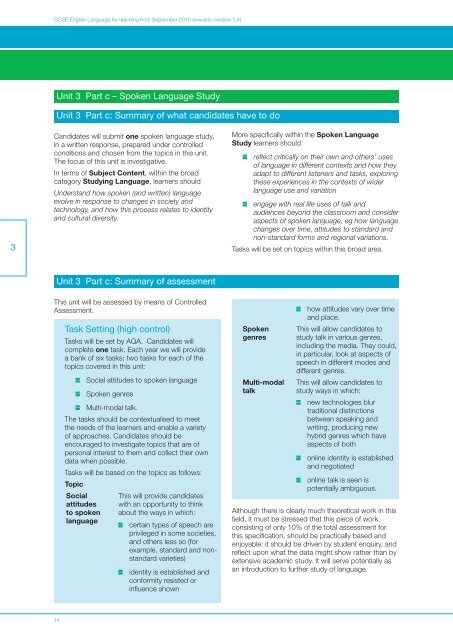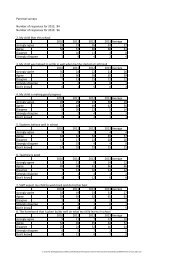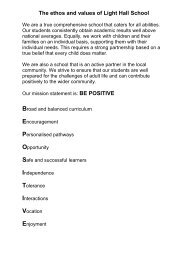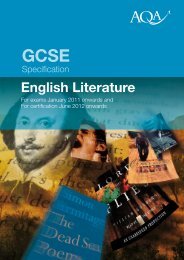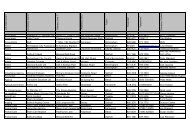GCSE English Language Specification Specification (version 1.4)
GCSE English Language Specification Specification (version 1.4)
GCSE English Language Specification Specification (version 1.4)
- No tags were found...
Create successful ePaper yourself
Turn your PDF publications into a flip-book with our unique Google optimized e-Paper software.
<strong>GCSE</strong> <strong>English</strong> <strong>Language</strong> for teaching from September 2010 onwards (<strong>version</strong> <strong>1.4</strong>)Unit 3 Part c – Spoken <strong>Language</strong> StudyUnit 3 Part c: Summary of what candidates have to do3Candidates will submit one spoken language study,in a written response, prepared under controlledconditions and chosen from the topics in this unit.The focus of this unit is investigative.In terms of Subject Content, within the broadcategory Studying <strong>Language</strong>, learners shouldUnderstand how spoken (and written) languageevolve in response to changes in society andtechnology, and how this process relates to identityand cultural diversity.More specifically within the Spoken <strong>Language</strong>Study learners shouldreflect critically on their own and others’ usesof language in different contexts and how theyadapt to different listeners and tasks, exploringthese experiences in the contexts of widerlanguage use and variationengage with real life uses of talk andaudiences beyond the classroom and consideraspects of spoken language, eg how languagechanges over time, attitudes to standard andnon-standard forms and regional variations.Tasks will be set on topics within this broad area.Unit 3 Part c: Summary of assessmentThis unit will be assessed by means of ControlledAssessment.Task Setting (high control)Tasks will be set by AQA. Candidates willcomplete one task. Each year we will providea bank of six tasks; two tasks for each of thetopics covered in this unit:Social attitudes to spoken languageSpoken genresMulti-modal talk.The tasks should be contextualised to meetthe needs of the learners and enable a varietyof approaches. Candidates should beencouraged to investigate topics that are ofpersonal interest to them and collect their owndata when possible.Tasks will be based on the topics as follows:TopicSocial This will provide candidatesattitudes with an opportunity to thinkto spoken about the ways in which:languagecertain types of speech areprivileged in some societies,and others less so (forexample, standard and nonstandardvarieties)identity is established andconformity resisted orinfluence shownSpokengenresMulti-modaltalkhow attitudes vary over timeand place.This will allow candidates tostudy talk in various genres,including the media. They could,in particular, look at aspects ofspeech in different modes anddifferent genres.This will allow candidates tostudy ways in which:new technologies blurtraditional distinctionsbetween speaking andwriting, producing newhybrid genres which haveaspects of bothonline identity is establishedand negotiatedonline talk is seen ispotentially ambiguous.Although there is clearly much theoretical work in thisfield, it must be stressed that this piece of work,consisting of only 10% of the total assessment forthis specification, should be practically based andenjoyable: it should be driven by student enquiry, andreflect upon what the data might show rather than byextensive academic study. It will serve potentially asan introduction to further study of language.14


